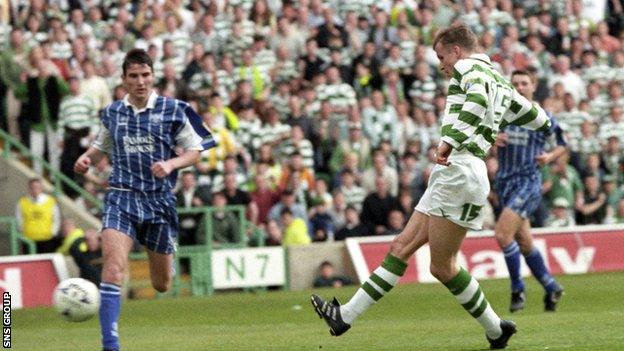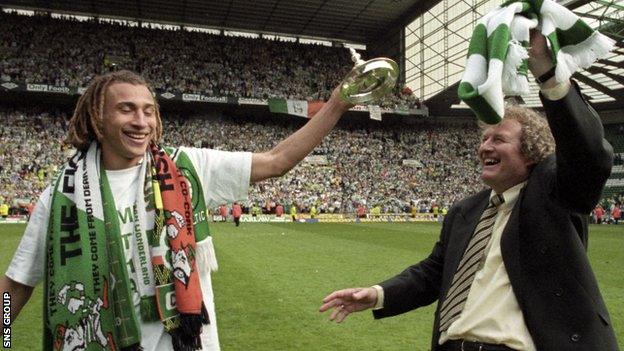When Celtic stopped Rangers' 10-in-a-row title bid
- Published
Larsson scores as Celtic beat St Johnstone to stop 10-in-a-row
Pressure. Hype. Nerves. Increase them all tenfold and you have the 1997-98 Scottish top-flight title race.
Celtic were on a mission - bordering on obsession - to prevent Rangers winning a 10th successive championship, surpassing the record of nine both clubs had achieved.
Rangers had Walter Smith - the second most successful manager in their history - in his final season at the helm. Celtic had sacked Tommy Burns and turned to unheralded Dutchman, Wim Jansen, as his replacement.
Here 25 years on, goalkeeper Jonathan Gould and striker Harald Brattbakk recount the season they helped stop the 10 with Jansen's Celtic.
Slow start leads to squad summit
Celtic's title challenge didn't exactly roar into life. Rather, it was a spluttering, inauspicious start after a summer of upheaval.
Jansen had been parachuted in with former Celtic midfielder Murdo MacLeod appointed his assistant. Also gone were the likes of influential captain Paul McStay and the 'Three Amigos' - the talented but troublesome strike trio of Paolo di Canio, Jorge Cadete and Pierre van Hooijdonk.
"I think everybody was fearing the worst," says Gould, who was among the raft of new signings along with a certain Swedish striker, Henrik Larsson. "There was a sense it would take time for us to gel."
Gould, who had been plucked from obscurity but would quickly become first-choice keeper, was blissfully unaware he had just been dropped into a maelstrom.
"At the time I was third choice at Bradford," he says. "When I first got that phone call to say Celtic were interested, you just see it for the club it is, the size, history. I had no idea about the enormity of what that season meant to the club and the fans."
Celtic began the league campaign with back-to-back defeats, with Larsson's underwhelming debut - his misplaced pass led to Hibernian's opening-day winner - giving little hint of his greatness to come.
The signs for the long-suffering support were alarming, and things soon came to a head inside the dressing room.
"Four or five weeks into the season, Wim had a meeting with the players because there had been a bit of confusion about what he wanted," Gould says. "It was things like style of play, set-up, are we going to play three at the back?
"But once that clarity had been established, the lads quickly believed in what Wim and Murdo were trying to bring to the group. That was shown by the fact we won the League Cup in the November of that season."
Derby win fuels belief
That 3-0 victory at Ibrox over Dundee United - to secure only Celtic's second trophy in eight years - was proof of a team growing in belief and cohesion.
By the time of the new year Old Firm derby on 2 January, Brattbakk had been signed for £2m from Rosenborg to bolster Celtic's strike force.
A 2-0 win - the only time Celtic came out on top in five meetings with Rangers that season - moved Jansen's side a point behind the Ibrox men and provided the launchpad for a title surge.
"I signed for Celtic in early December and that Old Firm derby was the first game I started," says Brattbakk, who is now an airline pilot in his native Norway.
"I was used to playing in the Champions League with Rosenborg and big matches in Norway, but running out on the pitch at Celtic Park that day is something I'll never forget. The noise was just amazing.
"I'm not going to say that game was a turning point, but it closed the gap and gave us belief that we could win the league."

Harald Brattbakk slots home the title-clinching goal against St Johnstone
'We needed a blowout'
Jansen's side kept their composure to reach the home straight in control of their own destiny. By the penultimate game of the season, they travelled to face Dunfermline knowing a win would be enough for the title.
A Simon Donnelly goal gave Celtic the lead. All they had to do was hold on. Enter Craig Faulconbridge, the home substitute looping a late header into the net. It would now all come down to the final 90 minutes at home to St Johnstone.
"I still vividly remember sitting on the team bus after the game. Everybody was deflated, they knew it was an opportunity missed to really enjoy the next week," says Gould. "To win it and then go back to Parkhead with people relaxed would have been a far better feeling."
How do you recover from such a demoralising blow, while trying to prepare for a seismic match the following Saturday?
"The boys were all on a downer, so the tension was unbelievable," recalls midfielder Craig Burley.
"On the Tuesday that week the pressure was at such a high point the lads were kicking lumps out of each other in training just because everybody was so tense about what might happen.
"Training was a disaster. Wim stopped it after about 20 minutes and sent everybody home. He said go away and clear the mind, we come back tomorrow and start again. That's how measured he was, bearing in mind it was Celtic's biggest game in years."
"We probably needed a blowout," adds Gould. "We went out on the Tuesday night to a Chinese restaurant called the Amber Regent, one of our favourite haunts.
"We had a few glasses of wine, put the Dunfermline game to bed as a group and cracked on with training on the Thursday. It was something we all felt we needed to do. Whether it was advisable ahead of a game of that magnitude, I'm not so sure, but it didn't affect us on the Saturday."
Brattbakk adds: "It was a nervy week because the hype was unbelievable by then. I must give Wim and Murdo credit because when you live in Glasgow and the race is on between Celtic and Rangers until the last game, there is no escape from it.
"You couldn't leave the house without being reminded about it, but Wim and Murdo were great at keeping us calm and focused."
'Best moment of my career'
The nervous tension was palpable among a capacity crowd when Celtic kicked off against a St Johnstone side seeking a win for European qualification. But Larsson's terrific curling strike after just three minutes acted as a release valve.
"It did settle us, but from my perspective and the back four we then knew a clean sheet was going to win us the title," says Gould. "So there was an extra amount of pressure heaped on."
That slender lead remained until the final minutes, when Brattbakk's big moment arrived. The Norwegian struggled to convince during his two years at Celtic, yet his crisp 12-yard finish into the bottom corner that day ensured he retains a special place of reverence among the support.
His goal clinched a 2-0 win, and the title. Operation stop the 10 was a success.
"I wasn't aware at the time of how important that season was," he says. "In fact, during my whole playing career I don't think I understood its significance.
"As the years have passed I've realised just how much it meant. I still get approached by people - sometimes even in Norway, and always whenever I'm back in Scotland - who want to talk about that game and that season.
"That game is the number one moment in my career. When my shot hit the net there was huge celebrations mixed with sheer relief from the supporters. Some were crying, there were so many emotions letting loose."
The post-match celebrations started were "worthy of such a momentous league title," according to Brattbakk. The party began in Glasgow before a three-day jolly in Portugal for a friendly against Sporting Lisbon.
Just a few days, later, though, Jansen left the club just as abruptly as he had arrived.
"It had been rumbling in the background for weeks," says Gould. "But you think, if we win the title that will put it all right. In the end Wim was a strong character - he had shown that in his coaching philosophy - and obviously felt his job was untenable despite his success."

Wim Jansen, right, quit as manager after leading Celtic to title success